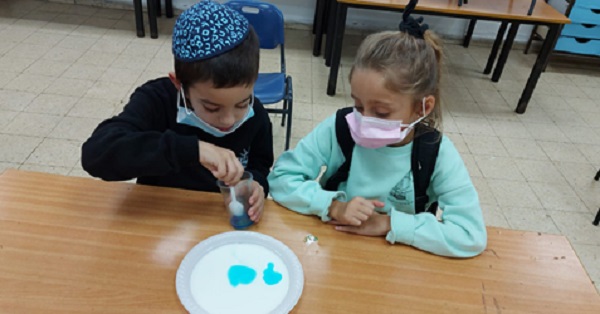Adding Up The Progress Of STEM In Israel

Two years ago, Rabbi Yosef Lassri and his wife noticed their son, Yair – who has autism spectrum disorder – was not progressing as well as he could with his grades in school at Yeshiva.
 They started to explore different options to better address his needs. That’s when they met Meirav Levi, principal at the Tachkemoni Elementary School, a public and coed school in Beit Shean, Israel. After learning about the school’s STEM (Science, Technology, Engineering, Mathematics) format, they decided to enroll Yair.
They started to explore different options to better address his needs. That’s when they met Meirav Levi, principal at the Tachkemoni Elementary School, a public and coed school in Beit Shean, Israel. After learning about the school’s STEM (Science, Technology, Engineering, Mathematics) format, they decided to enroll Yair.
Today, these parents think it’s one of the best decisions they have made. Since participating in Tachkemoni’s STEM teaching methods and the STEM Teen Scientific Leadership program, Yair’s educational and personal success has improved tremendously.
“Yair has blossomed since coming to our school,” said Levi. “He has been able to speak in front of the classroom, he is an active participant in all of the assignments, and now able to work in groups with other children. He is a great example of the power of the STEM approach to education and how it enables children to learn in the way they need to learn.”
Yair is just one of thousands of children across Israel who have benefitted from STEM education since the integration of the STEM approach was implemented by the Jewish Federation of Cleveland three years ago. Since that time, Jewish Cleveland’s sister city Beit Shean has increased its national STEM index of Israeli cities by 24 points.

“Over the last three years, the entire education system in Israel has been transforming. When we got involved with our partners there, we focused on developing a holistic approach to inspiring the children of Israel through education. We needed to capture their imagination early with hands–on experimentation and lesson plans that not only connected different subject matters but connected them to the world around them,” said Oren Baratz, senior vice president, external affairs for the Federation. “Three years into the process, we are excited about the progress we’ve made towards creating a sustainable educational ecosystem that starts in kindergarten and extends to the individual’s first job.”
“The Cleveland community invested in our learning environment. My teachers in the classrooms are able to focus on giving the children the skills and tools to learn and succeed. You are making my dreams come true.”
–Meirav Levi
Principal, Tachkemoni Elementary School
One of the most important factors of implementing STEM was training the staff – teachers, school principals, and other professionals involved in the education process. This is not only helping the individual school systems, but it’s helping the Ministry of Education in Israel.
“Before this program came to Beit Shean, STEM was just four letters – it had no meaning. Now, it stands for the mindset,” said Levi. “We quickly learned that STEM has to be taught by every teacher – the gym teacher, the language teacher, everyone. All of the teachers have the same understanding. We’re all working together.”
“We used to have so many textbooks in school, but now, we have classes where we’re taken outside the classroom,” said Tomer, a high school senior in Beit Shean, who is participating in a scientific literacy program, part of the STEM initiative. “I finally feel like we’re in school in the 21st century. STEM is a mindset. We’re taught how to manage and guide our lives, on top of learning the science and math. I always think about my future after the army. This education has helped me decide I want to go into a field where STEM is making an impact on the country and the world.”
Tomer was also part of a unique pilot project training teens for a STEM leadership program with elementary school age children, exposing younger children to STEM through engagement and interaction. “My sister is in love with science because of this program,” said Tomer. “It’s hearing a first grader saying to me, ’I had so much fun today!’ that’s what this program is about.
“I want to thank the Federation because now we are able to explore ourselves,” Tomer added. “We are all so enthusiastic about this program. This has allowed me to grow as a person and how I express myself – in Hebrew and English!”
“It’s a dream of every parent that their child will come to school and grow and develop with their own strengths,” said Levi. “My school is in a very low socio–economic area and Cleveland’s investment in the development of STEM is not only helping to fulfill my dreams, but it’s helping to achieve every parent’s dream of their children being happy, engaged, and learning. None of this could have been done without the support of the Federation and the Cleveland community.”
For more information on STEM education in Israel, contact Oren Baratz at obaratz@jewishcleveland.org or 216–593–2788.